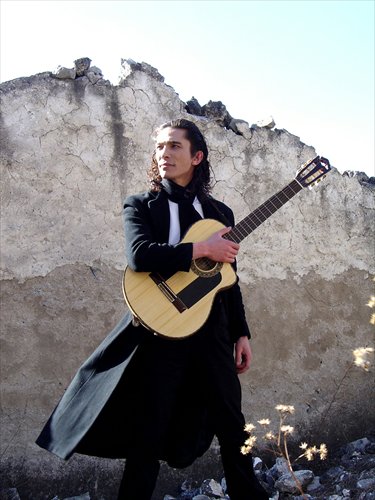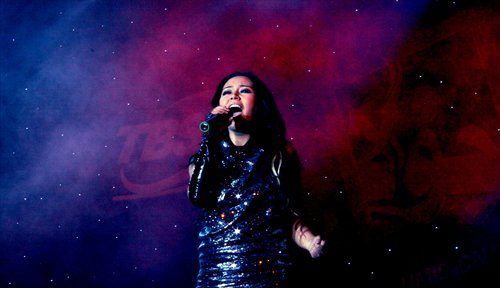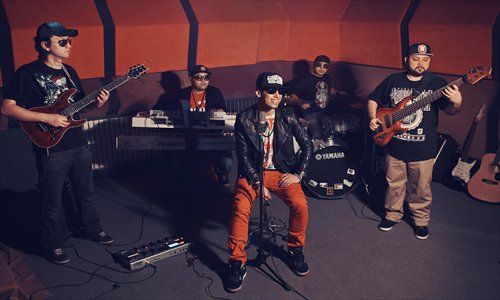New musical frontiers

Guitarist and singer Erkin Abdulla has released seven albums featuring original songs, but for televised appearances he is often asked to perform popular Uyghur folk songs. Photo: Courtesy of Compass Culture
Apart from their exotic features, band members of Loulan Box look a lot like any other Beijing indie rock outfit. The trio has an onstage swagger, sports fashionable clothes and attracts their loyal legion of fans who crowd live music venues each weekend to see the group perform.
But for a first-time observer, there is something besides band members' olive complexions and dark, wavy hair that makes them stand out: They sing in their native Uyghur. The group comprises Tayir Waris (vocals, guitar), younger brother Yaxar Waris (bass) and Faruk Tursun (drums) hails from Karamay, a northern city in the Xinjiang Uyghur Autonomous Region. Their band's name refers to the oasis city of Loulan on the Silk Road best known as the burial site of the Tarim mummies that date back to the Han Dynasty (206BC-AD220).
Since they were "unearthed" in 2006, Loulan Box has performed across China and carved out a successful niche by staying true to their musical and ethnic roots.
"The first time we sang in Uyghur it was only to see what kind of feedback we would get. In the past, you could immediately recognize a band was from Xinjiang once you listened to their songs' melody, tempo or chords. We want to break this mold," said Tayir Waris.
Loulan Box isn't alone in their quest to reshape how China and the world listen to Uyghur music. Whether performing pop, rock, rhythm and blues or even hip-hop, Uyghurs representing a variety of music genres are breaking away from their performing stereotypes promoted by TV galas.

Members of indie rock band Loulan Box (left to right) Faruk Tursun, Tayir Waris and younger brother Yaxar Waris. Photo: Courtesy of Loulan Box
Lyrically lost in translation
The Waris brothers were born into a musical family. Their father is a virtuoso of the rawap, a stringed instrument similar to the lute popular in Uyghur music. He originally opposed his sons' rock'n'roll ambitions, but has gradually come around.
"Rock is still not widely appreciated in Xinjiang. Many people still think it's very crazy and that all rock is heavy," said Tayir Waris, who from 2006 to 2008 studied at the Beijing Midi School of Music.
Waris returned to Karamay in 2008 to write songs with newfound determination to pursue his musical dream.
"Our father sometimes listens to our songs, some of which he thinks are good. At our concerts, we can feel the size of audiences growing with each show," said Waris, who works as a technician for an oil company.
Currently working on a second album, Waris is experimenting by writing songs with lyrics in Putonghua (standard Chinese). Although his songwriting is progressing well, the 30-year-old frontman isn't confident the album will be as well-received as others because of "cultural differences."
"Our lyrics aren't political; they just reflect our understanding of life. Some innocent words, such as 'freedom,' might be linked to recent incidents," he said, referring to the March 1 Kunming terrorist attack carried out by separatists.
Erkin Abdulla, 36, said the biggest problem for Uyghur musicians is making their music appeal to Chinese audiences outside of Xinjiang. When the Kashi-born flamenco guitarist performs overseas, he said people aren't bothered at not being able to understand his lyrics. But it's a different story in his home country.
"Chinese audiences seemingly need to understand lyrics, which is a problem for me," said Abdulla, a veteran performer on China Central Television's (CCTV) Spring Festival Gala. "Pop music in China usually has good lyrics, but unfortunately I am more focused on melody and style. Singing in Putonghua is my weak point."
Abdulla has produced seven albums, with his songs reflecting a lyrical mix of Uyghur and Putonghua as well as instrumentals.
"I have fewer opportunities to sing in Uyghur, even though my best songs are sung in it. It's not just a matter of simply translating lyrics. Uyghur as a language has many charms and nuances that can't be translated," he said.

Adile Sidiq, the first female R&B artist to sing in Uyghur. Photo: Courtesy of Adile Sidiq
Uyghur diva
Just as contemporary R&B has drawn influences from hip-hop in the US, this same has unfolded in Xinjiang and given some young women an outlet for expression.
Adile Sidiq hasn't let motherhood sideline her musical ambitions as the first woman to write and sing R&B songs in Uyghur. Sidiq, who has a 2-year-old daughter and is currently pregnant with her second child, stands out as one of the few Uyghur singers influenced by Mandopop.
The 29-year-old named Teresa Teng, Coco Lee and A-mei as her early idols before she pivoted toward R&B after becoming a fan of Mariah Carey in high school.
Despite majoring in Putonghua at university, Sidiq admitted she isn't confident about penning lyrics in the language. Another problem is that Uyghur and R&B don't go hand in hand phonetically.
"I try my best to reconcile language and style, but it's quite difficult," said Sidiq.
Even though she is a pioneer in her field, she admits it is too risky to quit her job as a civil servant at the moment to focus on music full time.
"Practically all the music that young people in Xinjiang listen to is from outside the region," she noted. "I want to introduce modern Uyghur music to the outside world."

Erpan Ishaq (seated middle) with his Uyghur soul group UB Scale. Photo: Courtesy of Erpan Ishaq
Striving for a good rap
Hip-hop is one of the fastest-growing music forms in Xinjiang, where many youngsters prefer to pick up the microphone and baseball cap instead of the rawap and doppa. Hurdles like language and cultural stigmas haven't stopped more Uyghur rappers from coming to Beijing to pursue their fortune.
As a member of Xinjiang's pioneer hip-hop crew Six City, Erpan Ishaq has been at the forefront of rap's revolution in his home region.
Ishaq, 24, has broadened his musical horizons by also experimenting with different vocal styles. In addition to being a part of Six City, he also performs on the side with soul outfit UB Scale. U stands for "Uyghur" and B for "black" in homage to their music's soul and R&B influences, he explained.
"You have to invent new styles to make people listen to the old-school music. When they are interested, they will go and find the traditional music for themselves," said the Urumqi native.
Ishaq, who names his music idol as Michael Jackson, said he hasn't performed or sampled Uyghur folk music in his current repertoires because he wants to first "fully master the style" of soul music.
Defying stereotypes
Many Uyghur musicians are in steady demand for shows where they are regarded as novelty acts. However, as minorities some feel obligated to live up to the "harmonious" stereotype associated with many of China's 56 ethnic groups.
"We want to tell people through our music that we don't all wear folk costumes every day and sing folk music," said Waris.
But this stereotype persists due to commercial pressure on Uyghur musicians to fall in line with audience expectations.
"A doppa has been put on our heads," said Abdulla, referring metaphorically to the skull cap worn by many Uyghur men. "Sometimes we are invited to perform because we have unique features and [event organizers] need minority singers."
Abdulla sang "Lift up Your Red Veil" at the 2005 CCTV Spring Festival Gala. He has performed at folk music festivals, charity fundraisers and on TV numerous times since 2002, but is often asked to perform popular folk songs "Lift up Your Red Veil" or "The Girl from Dabancheng" rather than his original compositions.
When Abdulla first approached record companies with his own songs, executives told him they had the making for a good album - provided a few well-known Uyghur folk songs were included.
"It's like running in circles. We all feel helpless about it," Abdulla said. "People think [folk songs] are what we should sing. The public's knowledge of Xinjiang is based on songs in movies from the 1980s or 1990s, but we have hip-hop, jazz and R&B. Many good [Uyghur] musicians can't crack the music market outside Xinjiang."
Abdulla, who experimented with rock'n'roll and electronic music before settling on flamenco guitar after a 2006 trip to Spain, said young Uyghur musicians struggle not to be pigeonholed as folk musicians.
He recalled difficulties in promoting his debut album, The Dolan Out of the Desert (2002), because he said it "wasn't folk or pop music." Critics didn't agree, however, with the album winning Best Folk Album and Best Rock Album at national music awards ceremonies.
"It's not like I don't want to sing these [folk] songs. We all need to survive before we can make the music we really like," Abdulla said.
Backlash after terror attack
Often treated with suspicion in big cities, Uyghurs have faced further testing times in the wake of the Kunming knife attack that claimed 33 lives. While keeping a low profile might be an option for some Uyghurs, musicians who rely on performing in public have endured a more difficult time.
Abdulla and Waris both told Metropolitan some of their upcoming TV appearances and concerts had been postponed or canceled.
For the few shows Loulan Box has had since March 1, Waris said everyone from TV program directors to livehouse owners had requested lyrics in advance to ensure they were "appropriate."
"I feel an invisible pressure these days. People scrutinize a band or musician more if they are from Xinjiang. They pay so much attention to the lyrics. In [Xinjiang's capital] Urumqi, we previously only had to report our song titles. Now, we need to submit all our lyrics," he said.